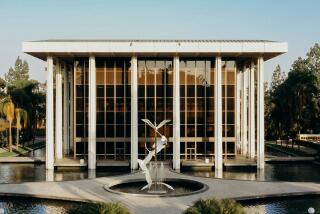MUSIC REVIEW : Rostropovich at Ambassador
- Share via
Mstislav Rostropovich has been much with us of late, in person and in the news. The determinedly protean musician and humanitarian has just been restored to membership in the Soviet Composers Union--which cast him out 11 years ago for his defense of Alexander I. Solzhenitsyn--and two weeks ago he conducted his National Symphony in concerts throughout the Southland.
Sunday evening at Ambassador Auditorium, it was the turn of Rostropovich the cellist. His only U.S. recital this season even produced the relatively rare appearance of Rostropovich the composer.
Sound of almost infinite variety supports Rostropovich’s vigorous interpretive imagination. Though quite capable of burly, booming efforts, the dramatic use of a still, chill, vibratoless pianissimo is one of his most striking characteristics.
That cold, enervated effect found appropriate application in the Adagio of Beethoven’s D-major Sonata, Opus 102, No. 2. Its extensions into the surrounding movements, however, seemed artificial. Patches of coarse articulation and intonation also contributed distance to a surprisingly detached account.
Maybe Rostropovich was just warming up. At any rate, he turned from subdued Beethoven to robust, firmly rooted Bach--the unaccompanied Suite in D minor, BWV 1008. The cellist is no period practice partisan, but he integrated the suite with sensitive authority, placing his emphasis on the central Sarabande. The Prelude and Allemande were practically one sustained line, while the other movements danced with strongly accented dignity.
Tchaikovsky’s melancholic Nocturne, and his own piece of bravura eccentricity, the Humoresque in C, Opus 5, gave Rostropovich ample opportunities to display wide-ranging character. He burned through his Humoresque like a manic barnstormer, after wringing the last elegant ounce of unexaggerated sentiment from the Nocturne.
In its outer movements, Miaskovsky’s reactionary Sonata in A minor, Opus 81, touches the same bases as the Nocturne and Humoresque, without particular distinction. The central Andante cantabile also provokes little interest beyond the moment, though Rostropovich gave it the benefit of his most silken, supple playing.
Technical assurance, interpretive eloquence and accommodating dynamics--even for Rostropovich’s most feathery playing--characterized the accompaniments of pianist Dmitry Paperno. The capacity audience, filling the pit and overflowing into on-stage boxes, cheered it all, and got the Bouree from Bach’s Suite in C, briskly played as a peasant dance, in encore.
More to Read
The biggest entertainment stories
Get our big stories about Hollywood, film, television, music, arts, culture and more right in your inbox as soon as they publish.
You may occasionally receive promotional content from the Los Angeles Times.










